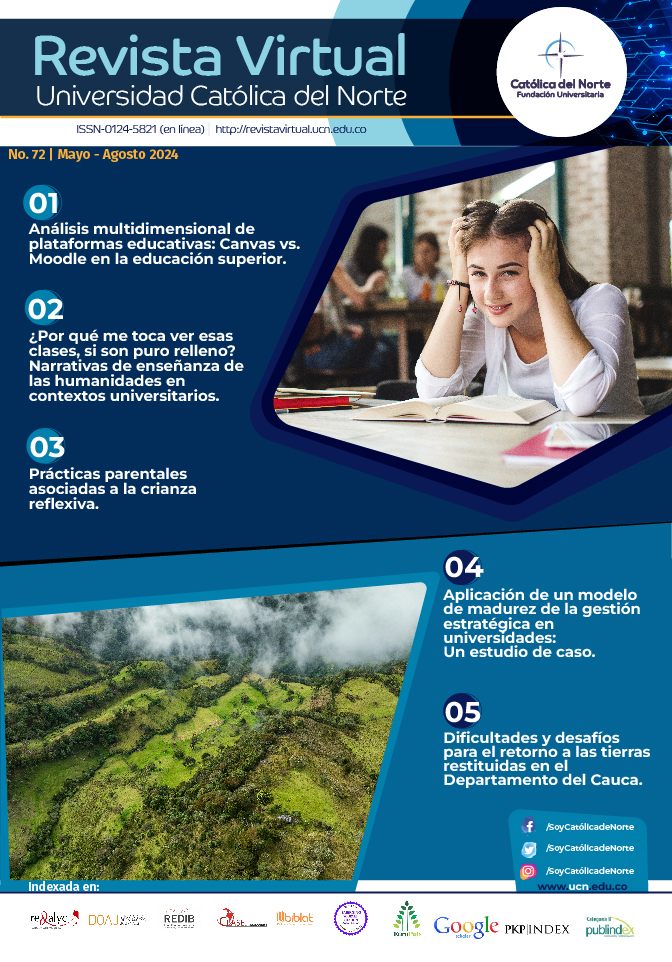Why am I assigned to attend these classes when they are just filler? Narratives of humanities instruction in university contexts
DOI:
https://doi.org/10.35575/rvucn.n72a4Keywords:
Learning, Higher education, Teaching, Humanities, Imaginaries, RepresentationsAbstract
The teaching of humanities in higher education has been the subject of criticism and debate due to its apparent lack of relevance in the modern world. This qualitative study aimed to analyze the imaginaries and representations of students and educators regarding humanities in higher education, with the purpose of formulating possible scenarios and approaches for humanistic education in this context, thereby addressing the gap between perceptions and reality. In-depth interviews were conducted with students and educators, focusing on a narrative approach characteristic of qualitative research, to gather perceptions about humanities in higher education. Content analysis techniques were employed to identify key elements in participants' imaginaries and representations. The analysis revealed a diversity of imaginaries and representations regarding humanities in higher education. Some emphasized its relevance for the development of critical skills and reflective thinking, while others expressed doubts about its practical applicability in the workplace. The findings enable the formulation of humanistic education approaches that respond to current challenges to foster a deeper understanding of humanities and their relevance in comprehensive education in today's society.
Downloads
References
Bartholomae, D. (1994). Writing on the margins: The essays on composition and teaching [Escribiendo al margen: Los ensayos sobre composición y enseñanza]. Bedford Books.
Bauman, Z. (2000). Liquid modernity [Modernidad liquida]. Polity Press.
Bourdieu, P. (1986). The forms of capital [Las formas del capital.]. In J. Richardson, Handbook of Theory and Research for the Sociology of Education (pp. 241-258). Greenwood.
Bourdieu, P. (1997). La ilusión biográfica. Razones Prácticas. Sobre la teoría de la acción. Anagrama.
Cohen, E. G., & Petrie, H. G. (2010). Addressing Achievement Gaps with Psychological Interventions [Abordar las brechas de rendimiento con intervenciones psicológicas]. Journal of Educational Psychology, 102(3), 616-628. https://eric.ed.gov/?id=EJ1006805
Creswell, J. W. (2013). Research design: Qualitative, quantitative, and mixed methods approach [Diseño de investigación: enfoque cualitativo, cuantitativo y de métodos mixtos]. Sage publications.
Davidson, C. N. (2017). The new education: How to revolutionize the university to prepare students for a world in flux [La nueva educación: cómo revolucionar la universidad para preparar a los estudiantes para un mundo en constante cambio]. Basic Books.
Freire, P. (1970). Pedagogía del oprimido. Siglo XXI Editores.
García de la Huerta, M. (2021). La formación en humanidades: desafíos actuales. Revista de filosofía, 78, 263-270. https://www.scielo.cl/pdf/rfilosof/v78/0718-4360-rfilosof-78-00263.pdf DOI: https://doi.org/10.4067/S0718-43602021000100263
García Jara, R., & Pineda, E. (2021, enero-junio). La educación desde la perspectiva de Tomás de Aquino en el contexto de la cibercultura. Hallazgos, 18(35), 319-339. https://doi.org/10.15332/2422409X.5497 DOI: https://doi.org/10.15332/2422409X.5497
Guillory, J. (2004). Genesis of the media concept [Génesis del concepto de medios]. Critical Inquiry, 30(2), 324-339. https://philpapers.org/rec/GUIGOT
Guldi, J., & Armitage, D. (2016). Manifiesto por la Historia (M. A. Galmarini, Trad.). Alianza.
Laboratorio de Investigación en Prospectiva, Estrategia y Organización. (2016). MicMac (Versión 5.3.0) [Software de computadora]. http://www.3ie.fr/lipsor/lipsor_es/mactor_es.html
Lyotard, J.-F. (1984). The postmodern condition: A report on knowledge [La condición posmoderna: un informe sobre el conocimiento]. Manchester University Press.
MacWhinney, B. (2000). The CHILDES Project: Tools for Analyzing Talk (Versión 07) [Software de computadora]. https://childes.talkbank.org/
Max Planck Institute for Psycholinguistics. (2022). ELAN: A professional tool for the creation of complex annotations on video and audio resources (Versión 6.7) [Software de computadora]. https://archive.mpi.nl/tla/elan/download
Nussbaum, M. C. (2010). Not for profit: Why democracy needs the humanities [Sin fines de lucro: por qué la democracia necesita las humanidades]. Princeton University Press.
Petersen, K., & Wampler, K. (2017). How to teach humanities in the digital age: The case for a new pedagogy [Cómo enseñar humanidades en la era digital: el caso de una nueva pedagogía]. Routledge.
Pineda, E., & Orozco, P. (2021). Pedagogía de las emociones para la construcción de paz en clave de capacidades y reconocimiento. Trabajo Social, 23(2), 101-125. https://doi.org/10.15446/ts.v23n2.90244 DOI: https://doi.org/10.15446/ts.v23n2.90244
Pineda Martínez, E. O., & Orozco Pineda, P. A. (2018, enero-mayo). La formación política como humanización mediada por la experiencia estética. Revista Virtual Universidad Católica del Norte, (53), 53-68. https://revistavirtual.ucn.edu.co/index.php/RevistaUCN/article/view/964
Pineda Martínez, E., & Orozco Pineda, P. (2021). Investigación en el campo de las humanidades: derechos de autor y acceso abierto. Revista Del IICE, (50), 41-54. https://doi.org/10.34096/iice.n50.11265 DOI: https://doi.org/10.34096/iice.n50.11265
Quintero, M. (2018). Usos de las narrativas, epistemologías y metodologías: aportes para la investigación. Editorial Universidad Distrital Francisco José de Caldas.
Román, C. E. (2008, mayo-agosto). Comentario al texto Las nuevas ciencias y las humanidades. De la academia a la política. Revista Virtual Universidad Católica Del Norte, 1(24), 1-19. https://revistavirtual.ucn.edu.co/index.php/RevistaUCN/article/view/140
Tedesco, J. C. (2000). Educar en la sociedad del conocimiento. Fondo de Cultura Económica. México.
Vásquez Rodríguez, F. (2016). Importancia de las humanidades en la universidad. Revista de la Universidad de La Salle, (69), 71-74. https://ciencia.lasalle.edu.co/ruls/vol2016/iss69/4/
Vega Cantor, R. (2011, julio-diciembre). Contrarreforma educativa en Colombia. El ágora USB, 11(2), 335-379. https://www.redalyc.org/articulo.oa?id=407748991005
Published
How to Cite
Issue
Section
License
Copyright (c) 2024 Revista Virtual Universidad Católica del Norte

This work is licensed under a Creative Commons Attribution-NonCommercial-NoDerivatives 4.0 International License.






